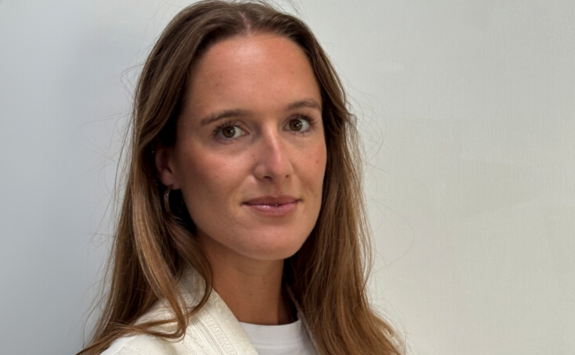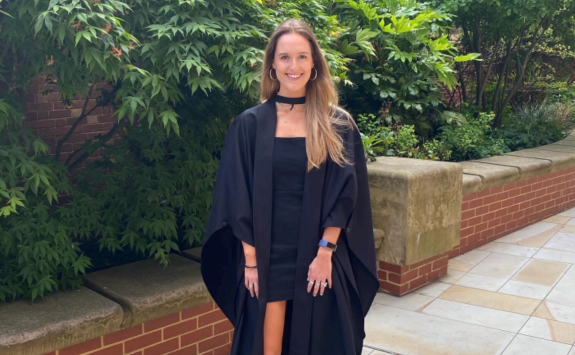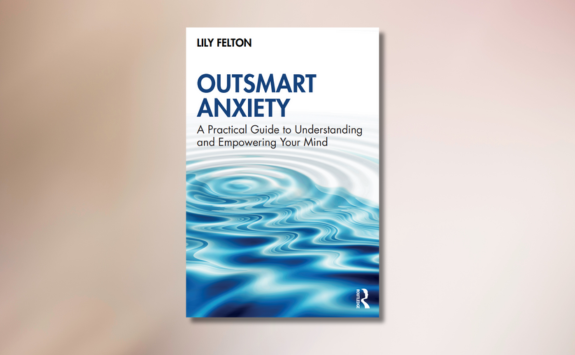Meet the Psychology graduate outsmarting anxiety
We sat down with alumna Lily Felton to discuss her soon-to-be-released book which gives readers the tools they need to navigate anxiety with confidence and clarity.
10 October 2025
Graduating with a degree in Psychology during a global pandemic, Newcastle alumna Lily Felton (BSc Psychology, 2020; MSc Forensic Psychology, 2021) soon found herself helping friends navigate mental health challenges. But when trying to offer support, Lily found much of the available research and advice overly medicalised and intimidating. To remedy this, she has set out to provide an accessible guide to managing anxiety for young people, which will be published in February 2026.
We recently spoke with Lily about her experience at Newcastle University, what it was like to study during COVID-19, and the inspiration behind her forthcoming book – Outsmart Anxiety: A Practical Guide to Understanding and Empowering Your Mind.

Hi Lily! What first got you interested in psychology and mental health?
I’ve been asked this question many times, and to be honest it didn’t start with one big moment- things just unfolded gradually. . I got the chance to study Psychology at sixth form, and despite not putting much thought into it at the time, it turned out to be the most engaged and captivated I’d ever felt in the classroom. It was a toss-up between English Literature and Psychology for my degree, but it seemed only logical to pursue the subject I still felt I had so much more to learn from and so many avenues to explore.
I felt there was more to uncover, so I stayed on at Newcastle to pursue a Master’s in forensic psychology. When it came to looking for a job, I knew I wouldn’t last a second in a prison or a forensic ward, despite my initial confidence that I could handle anything, which has led me into the field of clinical psychology in London.
Looking back, it seems only fitting that I was torn between psychology and my passion for writing, and now here I am as an emerging author (if I’m allowed to call myself that yet!)
Tell us about your time at Newcastle University.
It’s no secret that Newcastle is a vibrant, social city, with nights out that don’t break the bank. This alone is reason enough for most to turn a blind eye to the year-round freezing cold! Truth be told, my top criterion was simply to find a university as far away as possible from my tiny little village on the east coast of England which didn’t even have public transport, never mind a club!
I quickly realised that there was so much more to learn; I had hardly scratched the surface when I left university, and that sense of curiosity is what really excites me about psychology.
My time at Newcastle really shaped my interests in mental health and research. The course exposed me to the complexities and intricacies of mental health across different domains - clinical, forensic, sport, and more - and showed me the value of research in advancing modern-day practices and support pathways. I quickly realised that there was so much more to learn; I had hardly scratched the surface when I left university, and that sense of curiosity is what really excites me about psychology.
Alongside my studies, I was on the university hockey team, which was as much about the social side as the sport. I quickly learned the fine art of juggling deadlines, training sessions, and the inevitable hangovers!
What is a standout memory from your student days?
One memory that will stay with me forever was the University ski trip in second year. I would recommend it to anyone, regardless of skiing ability. My best mate had only skied once before and loved every second… mainly because she spent most of it at Le Folie Douche (an après-ski bar)!
One night, after a few too many shots, we made our way up the escalators from the bars to our accommodation. A short icy patch between two escalators caught me completely off guard and before my brain could even process it, my face hit the ice. The look on my friend’s face was enough to know I had done some real damage, but that didn’t stop her laughing and immediately pulling out her phone to photograph the whole incident! By morning, my face was so swollen that even getting my ski goggles on was a mission. I’m still waiting for an apology from my friend, who, somehow, is still my best mate to this day.


You graduated from both your undergraduate degree and your Master’s during the COVID-19 lockdowns. What was that like?
What I thought would be a massive barrier for my career turned out to be an opportunity to push boundaries (academically speaking!), take on new challenges, and adapt to a new normal amidst a global experience like no other. Don’t get me wrong, it was challenging. But we all had no choice but to flip it on its head and make the most of the situation, or risk crumbling. I learnt discipline, resilience, and how to manage uncertainty in ways I hadn’t anticipated.
It also made me realise the value of human connections. It’s strange how sometimes we only truly appreciate what we’ve had once it’s taken away. I reflected on how special my time at university had been - the friendships, the shared experiences, the laughs - and how important it is to cherish those moments and people.
Graduating during the pandemic also gave me perspective on mental health in a very tangible way. Experiencing isolation and witnessing the impact on my friends and peers made me more aware of the challenges young people face today. It inspired me to think about ways to support others in meaningful ways and reinforced why I’m so passionate about empowering young people when it comes to their mental health.
Being at university during COVID had a huge impact. It made me realise just how profoundly isolation affects loneliness and mental health, especially anxiety.
Is that where the idea for your book came from?
Following university, a number of friends and family discreetly sought my advice on various mental health challenges. With a pandemic creating uncertainty and isolation, many people worldwide were suffering in silence. One day, my cousin reached out, struggling with anxiety and unsure how to move forward. I began researching resources that were informative and educational without being overly medicalised or intimidating.
Truth be told, I found it difficult. There’s so much incredible research out there but not much presented in a way that young adults could easily understand and act on. So, I started writing my own resource for my cousin, including personal anecdotes and short stories from others going through similar experiences, to help her feel less alone.
From there, it snowballed. I realised that if this could help one person, it had the potential to reach many more. As the pages grew, so did my confidence in its reach and necessity.
Anxiety is the most common mental health challenge among young people, and I wanted to create something accessible, practical, and reassuring for those who might be struggling in silence.
Conversations around mental health are much more prominent now. What else needs to be done to reduce the stigma?
The growing awareness around mental health has been really positive, but it does come with some risks - such as a tendency to conflate normal stress with clinical issues, overdiagnosis, and sometimes self-diagnosis. We’ve become so attuned to its presence that even the small, everyday worries that are simply part of being human can sometimes get pathologised. So as much as we need to continue the conversations, I think we also need to pay attention to understanding mental health itself.
I think the key lies in understanding the ‘why.’ If people can grasp what’s happening at a basic psychological level, they’re better equipped to manage it in their own lives. Knowledge really is power. The only certainty in life is that we’ll all face adversity and hardship in some form, so it’s important to have tools to manage smaller worries and anxieties early on. That way, we can build resilience and be better prepared when life inevitably throws bigger curveballs our way.
My aim isn’t to minimise anyone’s experiences or feelings, but to help people understand their own minds a little better- so they can feel more capable, more resilient in daily life, and perhaps even support others to do the same.
It’s also important to acknowledge that, while it’s great that conversations around mental health have grown, awareness alone isn’t enough- it needs to translate into tangible action, otherwise it risks remaining just talk. That means creating workplaces and schools where mental health is openly supported, making professional help more accessible at every level, and ensuring diverse perspectives are included so that everyone can see a way forward. Action and talk together can create a ripple effect that not only normalises openness but also ensures no one feels brushed aside.
While it’s great that conversations around mental health have grown, awareness alone isn’t enough. It needs to translate into tangible action, otherwise it risks remaining just talk.
What are your top three tips for managing anxiety?
There are so many different things that can help with anxiety, and what works for one person might not work for another. It’s really about experimenting and finding what fits you best on an individual level. Having said that, there are a few universal tips that I think can benefit everyone.
- Don’t fight anxiety- understand it.
Anxiety isn’t a flaw, it’s your brain’s alarm system kicking into action. The more you resist it, the louder it gets. Making sense of what’s going on in your mind can make your symptoms far less overwhelming and takes the power away from anxiety. - Focus on small, manageable steps.
We love to go big, but this is often the perfect breeding ground for anxiety. Breaking things down into smaller, more realistic steps can help curb the overwhelm. Think SMART goals: Specific, Measurable, Achievable, Relevant and Time-bound. Even small actions, like a 10-minute walk, can create a ripple effect, gradually building confidence and making bigger challenges feel more manageable. - Don’t be afraid to reach out.
Anxiety thrives in silence. It convinces you that you’re the only one struggling, when in reality so many others are going through the same thing. Talking about how you feel - with a friend, family member, or even a colleague - can make a huge difference.
If you want to find out more on what works for you - and learn how to put these strategies into action - read my book Outsmart Anxiety. The book focuses on helping young people manage anxiety in accessible and practical ways. It’s currently available to add to wish lists and will go on presale in the new year, with release scheduled for February 2026.
Outsmart Anxiety: A Practical Guide to Understanding and Empowering Your Mind
Lily’s book offers readers a comprehensive and compassionate exploration of anxiety, providing the tools to navigate their own experience with confidence and clarity.
With her friendly and relatable voice, complex concepts are broken down into clear, practical insights that explain what anxiety is and why it arises. Through real-life examples, personal stories, actionable tips, and evidence-based strategies, Lily’s book blends professional expertise with genuine experience to create an accessible and empowering guide.
Ideal for teenagers, young adults, parents, teachers, and mental health professionals, Outsmart Anxiety serves as an essential toolkit to deepen understanding of anxiety and develop self-awareness - whether for oneself or in supporting others.

